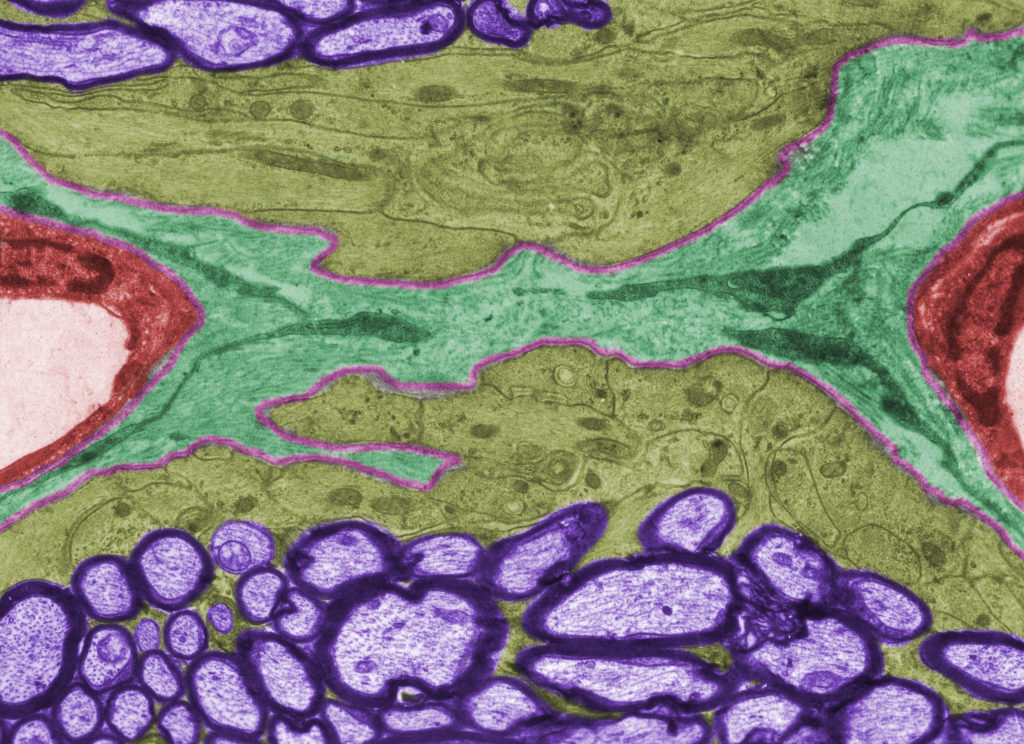Quick Hits
Daily brief research updates from the cognitive sciences

This sounds pretty gruesome – your brain starting to eat itself, like some sort of disease in a horror film. However, research recently published has shown that this process, which we have known about for a long time, is important in developing memory in the short term.
But let’s understand how the brain can eat itself in the first place. There are a number of ways the brain, or rather specific cells in the brain and most of these are good for the brain, digest parts. Firstly, we know that as the brain develops in early childhood there is a key phase of so-called pruning. This is when the brain, or specifically a form of helping cell in the brain called glial cells, cut back connections in the brain. This helps make our brains more efficient and stabilises certain memories and functions.
There are also other processes, and these are often part of everyday cleaning processes whereby a type of glial cell will clear out toxins collected in the brain – and then there is a process whereby damaged cells are cleared out. If the brain does this overenthusiastically, for example after stroke, this can inhibit brain functions.
This we know, but we didn’t know how this works in a day-to-day basis and how this helps plasticity, our brain to develop and learn new things, and therefore memory.
This is where Yosuke M. Morizawa and colleagues at Tohoku University in Japan managed to discover more. They focused on what are called Bergmann Glial Cells and managed to image these as they were “nibbling” on synapses, connections, between neurons.
What was interesting is that when the researchers managed to genetically inhibit this process the learning in mice was blocked. This therefore shows that those cells, by eating away at our brain connections after a learning process, enhance learning.
Therefore, this eating away at our synapses, likely clears out toxins but also improves efficiency of processing and therefore helps us learn more.
So, there you have it your brain eats itself to stay more efficient – but only in a small way, thankfully.

Andy Habermacher
Andy is author of leading brains Review, Neuroleadership, and multiple other books. He has been intensively involved in writing and research into neuroleadership and is considered one of Europe’s leading experts. He is also a well-known public speaker, speaking on the brain and human behaviour.
Andy is also a masters athlete (middle distance running) and competes regularly at international competitions (and holds a few national records in his age category).
References
Yosuke M. Morizawa, Mami Matsumoto, Yuka Nakashima, Narumi Endo, Tomomi Aida, Hiroshi Ishikane, Kaoru Beppu, Satoru Moritoh, Hitoshi Inada, Noriko Osumi, Eiji Shigetomi, Schuichi Koizumi, Guang Yang, Hirokazu Hirai, Kohichi Tanaka, Kenji F. Tanaka, Nobuhiko Ohno, Yugo Fukazawa, Ko Matsui.
Synaptic pruning through glial synapse engulfment upon motor learning.
Nature Neuroscience, 2022
DOI: 10.1038/s41593-022-01184-5
More Quick Hits
Breastfeeding Improves Mother’s Cognitive Abilities — Years Later
Quick HitsDaily brief research updates from the cognitive sciences o are you saying that breast feeding is not only good for the infant but also the mother?!Yes, we’ve know for a long, long time that breastfeeding is very good for the infant. Over...
Mothers Can Pass on Stress to Future Generations
Quick HitsDaily brief research updates from the cognitive sciences presume you’re not just talking about stressed mothers stressing out their kids and/or grandchildren?Not precisely. I’m talking about passing on stress activation patterns in DNA...
Learning Before Age Five Can be Seen in the Brain Forty Years Later
Quick HitsDaily brief research updates from the cognitive sciences ducation before age five leaves structural changes to the brain, identifiable forty years later — impressive! This is the beauty of long-term longitudinal studies (the negative side...
Exercise in Childhood Predicts Healthy Brains (into Adulthood)
Quick HitsDaily brief research updates from the cognitive sciences k, we all know by now that exercise is good for you. Many of you may also be more than aware that exercise is a potent stimulator for the brain encouraging brain growth and...
The Surprising Truth of Why Powerful People can be Toxic
Quick HitsDaily brief research updates from the cognitive sciences e’ve all heard the stories of toxic bosses, and powerful people who happily destroy other people’s lives, and show no compassion to those less fortunate than themselves. There is a...
Leadership Behaviours for More Resilient and Effective Teams
Quick HitsDaily brief research updates from the cognitive sciences hat makes for effective and resilient teams is something that interests many leaders and organisations. I have spoken about some of these aspects in other articles, particularly...






